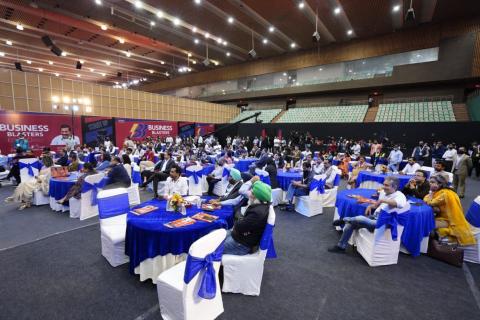
Entrepreneurship Mindset Curriculum : A journey from 'resistance' to 'acceptance' to 'excellence'.
When the EMC curriculum was launched in 2019, teachers were quite apprehensive about the idea. The curriculum was introduced for the students of secondary and higher secondary classes in the government schools of Delhi. Teachers taking classes 10th and 12th saw it as an unnecessary encroachment in their teaching time for the ‘all-important’ board classes. There was huge resistance. I often witnessed few teachers pouring out their concerns "Sir aap to jante hi hain board classes wale bachchon ke samay ka nuksan ho raha hai!". After lending an empathetic ear, I have always been doing my bit of convincing them to see the brighter side.
EMC was designed to bring a fundamental shift in the mindset of students. Quoting the mastermind behind this initiative, Minister (Education) Sh. Manish Sisodia , "Entrepreneurship is a mindset and it can be displayed at any place, whether it’s a housewife managing the family or a collector managing a district. It is about having big dreams, courage to take risks and ability to bounce back in the face of failure.” Thus he contradicted the common notion of teachers "ye un bachchon ke liye hai jo padhne me theek nahi hain”.
In the teething years, when students started engaging in the EMC activities and listened to the stories of the successful entrepreneurs, a significant shift could be observed in their mindset. Teachers found and shared that it had been helping students perform better in other subjects as well. This led to a wider acceptance.
The recent introduction of Business blaster (BB) component fuelled EMC towards greater excellence. It has proved to be a game changer. BB provided an opportunity for the schools to bestow trust in the unfathomable energy of the youngsters. Several studies advocate the agency of students and the power of ideas, and this had been tried by some progressive schools too. Infact, this has been the maiden experience when a public education system had decided to experiment with the agency of its students at such a large scale. Students of grades 9 to 12 could benefit from such a once-in-a-lifetime opportunity to test their entrepreneurial ability in the real world. BB program also paved way to end the ever-existing divide between the classroom-knowledge and its practical usage in daily life. The opportunity came for the students to prove how passionate they have been about their dreams and system was aligned and equipped to support the budding entrepreneurs by giving them wings to take their first flight into the skies of ideas and talents.
Earlier, if some students tried to do something unconventional, the biggest stumbling block they faced was…kahin teacher ko na pata chal jaye (What if teacher comes to know about it). This project, on the contrary, opened avenues for the teachers to interact with the students and encourage them to think creatively. It has been so pleasing to hear the teachers urging students ”Please think of some innovative ideas! Don’t worry about the resource or any other help you may require. We are here to provide it.”
The access to live entrepreneur interaction sessions and rendezvous with business coaches has brought about the desired transition. Breaking through the stereotypical marks-oriented projects, BB programme is a one of its kind venture which has empowered students to be the change-agents who can in some way 'transform' the lives they touch. Besides getting an opportunity to interact with the leading entrepreneurs and even to work with them, the deserving students are also offered direct admission in Delhi Skill and Entrepreneurship University.
This appears to be a unique experiment time when a public education system has decided to implement what American philosopher and educationist John Dewey had been advocating...Project-ideas rooted in the real world where the participants live. Gandhi too tried to implement it in a little modified and adapted version through Nai Taleem, soon it was seen as alternative mode of schooling and could not be accepted in the main stream. The advocacy for the learner-centric education was still peripheral, but the introduction of EMC has pushed it to the core and has entrusted our learners with the agency of autonomy - where they are not only free to ideate but also have enough resources to experiment with their ideas.
Top hundred projects under the BB programme have been selected through a rigorous process and students have earned a place to display their idea in an 'expo' organized by the department. Such a grand platter brings the students in direct interaction with the funders and sell their idea convincingly. This is a practical glimpse into the world of trade - where our aspiring entrepreneurs are learning some core business skills like marketing, persuasion, negotiation, etc.
For decades, schools have been functioning as an isolated body. The effort to bridge the gap between the community and the school had so far been proved non-permanent in nature. However, this unique exercise has catalysed a shift in perspective of all stakeholders - especially our students. They are now able to see a direct link between what they study at school and what market and society expects from them. Such a major breakthrough is applaudable. The question henceforth is how can the success of EMC framework be utilized in fostering such practical learning(s) in other disciplines as well.
- Log in to post comments
